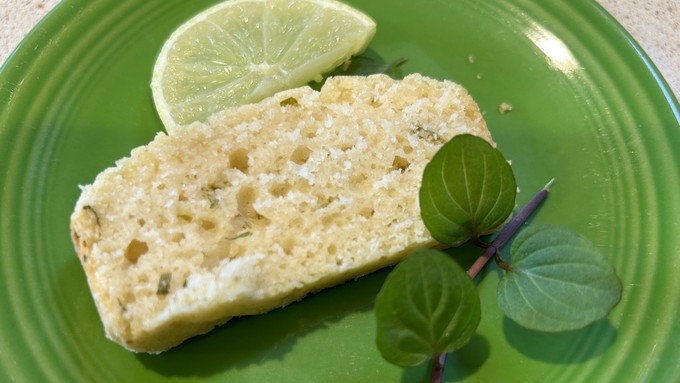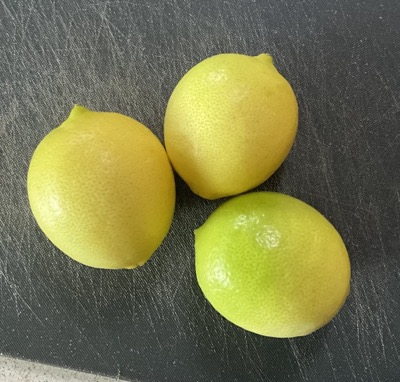
Recipe: Zest and herb combination also works in muffins

Lime-mint bread is spectacular with coffee or tea. The mint sprig on the plate is from a lime mint; it also makes excellent tea itself. Kathy Morrison
This is an off year for my orange tree, but my lime tree has made up for the citrus gap. The fruit is ripening quickly, so I'm trying to use it up. (Can't give it away, unfortunately, thanks to the Oriental fruit fly quarantine.)

I hit on putting lime and mint together in a quick bread, and found an easy Betty Crocker recipe to adapt. I used a mint actually called lime mint, but just about any mint would work -- spearmint probably better than peppermint. Sub lemon for the lime if you want, or try 1 teaspoon orange zest in place of half the lime zest.
I baked my tea bread in two disposable aluminum pans, because I planned to take it to a potluck. The two smaller loaves take less time to bake and are easier to cut for serving. But use whatever good bread pan you have available.
This recipe also makes spectacular muffins, baked for about 20-25 minutes.
Lime-mint tea bread
Serves 16
Ingredients:
1-3/4 cups unbleached all-purpose flour
3/4 cup granulated sugar, organic if possible
2 teaspoons baking powder
1/4 teaspoon salt
1 egg
1 cup buttermilk
1/4 cup neutral vegetable oil
2 teaspoons grated lime zest, from 1 large or 2 small limes
3 tablespoons fresh lime juice, divided
Handful of fresh mint leaves, finely chopped (about 2 teaspoons)
1 tablespoon plus 1 teaspoon granulated or confectioners' sugar, for brushing
Instructions:
Heat oven to 350 degrees. Grease and lightly flour a 9-by-5-inch bread pan or two small disposable pans.
In a medium bowl, whisk together the flour, 3/4 cup granulated sugar, baking powder and salt.
In another bowl or large measuring cup, combine the egg, buttermilk, oil, lime zest, 1 tablespoon of the juice, and all the mint.
Stir the liquid mixture into the flour mixture until moistened. Some lumps may be visible, but that's OK -- quick bread should not be overmixed.
Bake until the top starts to brown and a toothpick inserted in the center comes out clean, 50 to 60 minutes for a standard loaf pan, 40-45 minutes for the smaller pans.
Meanwhile, combine the remaining 2 tablespoons of juice with the remaining granulated sugar or the confectioner's sugar, whichever you're using. (It will be a thin mixture, not like cake glaze.) When the bread comes out of the oven, brush the mixture over the top. Let cool 10 minutes on a rack, then remove from pan(s) and allow to cool thoroughly before cutting and serving.
Comments
0 comments have been posted.Sacramento Digs Gardening to your inbox.
Sites We Like
Garden Checklist for week of July 21
Your garden needs you!
* Keep your vegetable garden watered, mulched and weeded. Water before 8 a.m. to reduce the chance of fungal infection and to conserve moisture.
* Feed vegetable plants bone meal, rock phosphate or other fertilizers high in phosphate to stimulate more blooms and fruiting. (But wait until daily high temperatures drop out of the 100s.)
* Don’t let tomatoes wilt or dry out completely. Give tomatoes a deep watering two to three times a week.
* Harvest vegetables promptly to encourage plants to produce more. Squash especially tends to grow rapidly in hot weather. Keep an eye on zucchini.
* Pinch back chrysanthemums for bushy plants and more flowers in September.
* Remove spent flowers from roses, daylilies and other bloomers as they finish flowering.
* Pinch off blooms from basil so the plant will grow more leaves.
* Cut back lavender after flowering to promote a second bloom.
* It's not too late to add a splash of color. Plant petunias, snapdragons, zinnias and marigolds.
* From seed, plant corn, pumpkins, radishes, winter squash and sunflowers.